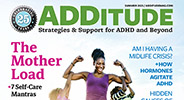“Over Time, My Stored-Up Anger Exploded.”
“How well I did in school became the standard by which I judged myself; it was a performance that had to be perfect. When I did not meet my own expectations, I blamed myself, and my self-esteem plummeted.” How one man with ADHD overcame his growing anger problem.

How Does ADHD Impact Anger and Emotions?
As an adult with attention deficit disorder (ADHD or ADD), I know what it is to struggle with frustration and anger. My story is not new. Over the last several years, there has been evidence of a strong emotional component of ADHD. Those with ADHD — particularly men — often have a difficult time regulating their emotions, especially when faced with frustration and stress. Their angry outbursts hurt their relationships with family and friends. Let me tell you my story.
When I was a teen, I didn’t know that I had ADHD. I did know that I daydreamed a lot and had to work harder than everyone else to succeed at anything. I wondered why other people could accomplish things more easily than I could. I was driven to do well, and, most of the time, I overcame my weaknesses.
School was always important to me, almost too important. How well I did in school became the standard by which I judged myself; it was a performance that had to be perfect. I wanted to prove to others that I was as capable as they were. Having ADHD, I naturally struggled to keep up in school. When I did not meet my own expectations, I blamed myself, and my self-esteem plummeted.
My tolerance for being disappointed sank, and every frustration or annoyance ticked me off. I couldn’t deal with failure or allow myself to make mistakes. I compared myself to others, always unfavorably. I couldn’t take anything in stride, and became infuriated if a situation seemed unjust or someone made a minor mistake. As I got older, I learned that the way I handled my emotions was due to my low frustration tolerance. I alienated everyone around me.
When anger gets out of hand, it affects every area of a person’s life, especially relationships with family and friends. Men with ADHD are at high risk for uncontrolled anger when they feel like they’ve failed. Many have had job losses, and have not been able to care for the needs of their family. School was the focal point of my life, and I struggled to keep up with the people I admired. Over time, my stored-up anger exploded. I discovered that anger compromised my happiness at home and in school.
[Take This Test: Could I Have ADHD or ADD?]
Anger in Adults with ADD
Anger followed me into adulthood, and it affected my relationship with my family. I wanted my children to be competitive in school and to succeed as I never could. I was trying to fill holes from my past that couldn’t be filled. To complicate the matter more, both of my children had ADHD, which affected their school performance.
I was frustrated because they did not turn out to be the ideal students I wanted them to be. I praised my children many times for many things, but when it came to school, I pushed them to try harder. Of course, kids with ADHD try as hard as they can. Even though I knew that kids with ADHD often need help in school, with my own children, I couldn’t be objective. The only thing that I succeeded at was shutting down communication with my children.
Change for the Better
How did I change my attitude? I became aware that I didn’t have control over my emotions, and this resulted in frustration and anger. There were warning signs and triggers, such as feeling my heart pounding, breathing fast, or clenching my hands or jaw. I tried to heed the warnings to manage my anger before it got out of control. I learned to act, not react. I took the following steps to bring peace to my family and home life:
- I learned to give my children unconditional love and acceptance. They did not need to meet my impossible standards.
- I got more sleep. When you meet your sleep needs, you improve your ability to self-regulate and to make better choices.
- I gave myself time-outs when I faced a stressful situation. Whenever I felt myself getting tense, I exercised or listened to music. By getting away and giving myself space to think clearly, I saw what mattered most to me — my relationship with my family.
- I learned that not everything is worth fussing about; life is too short to argue over every small thing.
- I taught my children that failure isn’t such a bad thing. You can learn from it, something I wish I had known growing up.
- I admitted that I couldn’t solve all the world’s problems. I needed to back off and give my children the acceptance that I had longed for. They were free to lead their own lives and to learn to succeed on their own. Once I wasn’t attached to the outcome, a lot of stress was lifted from my shoulders. I was able to talk freely with them again, and that increased the trust between us.









